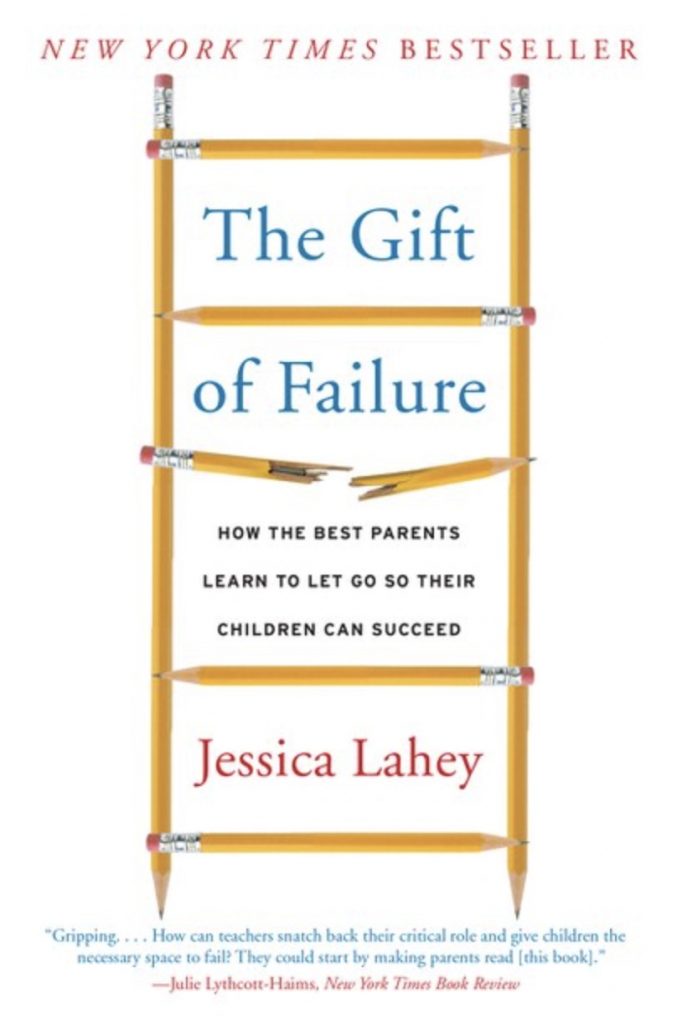Key Quote:
“A child who believes he’s ready for the deep end of the pool because you praised his incredible talent as a swimmer when he flopped through his first two freestyle strokes is in much more danger of drowning than a child who has a realistic sense of his abilities. Be honest with your children. Praise them for their resilience and the efforts they make to recover from their mistakes. Above all, keep your eye on the prize: intrinsic motivation” (p. 36). — Jessica Lahey
Key Points and Concepts
Introduction
Lahey believes parents need to put their own insecurities and expectations aside and raise children to be autonomous. This can be done through using intrinsic motivation, increasing individual responsibilities, allowing children to decide how to meet non-negotiable standards, and refusing to remove challenges and consequences when children stumble or fall. Autonomous children accept and enjoy responsibility and leave home ready to face a world where failure is expected and met with confidence, rather than fear.
The Results of Fostering a Fear of Failure
Parents and children alike are often paralyzed by the fear of failure, in academics, athletics, or relationships. An ‘F’ on a test or a playground argument prompts many parents to intervene in the form of emergency parent-teacher conferences and demands immediate improvement. What do these actions teach children who are watching and imitating their authority?
Children learn to view any form of failure as the first stride down a perilous slope that will leave them at the bottom without any hope of recovery, and parental overreactions to common or necessary life mistakes develop this theme. “Every time we rescue, hover, or otherwise save our children from a challenge, we send a very clear message: we believe they are incompetent, incapable, and unworthy of our trust” (p. xxi).
Lahey recognizes these parental patterns of frustration create dependent, anxious, timid children who refuse to challenge themselves. “If we teach them that messing up means the world will crumble around them, we only succeed in reinforcing fear of failure” (p. 57).
History and life experience teach the opposite lesson. The greatest scientific, medical, and artistic discoveries emerged after years of rejections, oversights, inaccuracies, omissions, and abject disappointment. “The setbacks, mistakes, miscalculations, and failures we have shoved out of our children’s way are the very experiences that teach them how to be resourceful, persistent, innovative, and resilient citizens of the world” (p. xii).
Instead of reacting in horror, parents need to step back and allow children to miss homework assignments because of irresponsible behavior, wear wrinkled clothes because they didn’t fold them in time, and fight through a difficult assignment that doesn’t come naturally. “Kids learn the most about sticking with a task when it’s hard, when they are sure they will never figure something out, or when they are suffering the consequences of their own procrastination or botched planning” (p. 206).
The Power of Intrinsic Motivation
Children are natural born explorers; always looking to uncover what’s hidden and learn about the world around them. This drive to discover the unknown begins as soon as infants realize they can control their own hands and escalates as they crawl, walk, talk, and dance their way through toddlerhood. So, what happens to that innate drive to explore and learn by the time your 6-year-old cries over an addition worksheet? Lahey believes incentive rewards for behavior inhibit creativity and risk taking, creating children who fear failure and abandon natural curiosity for exploring the world around them (p. 32).
Intrinsic motivation is powerful and can create a life-long love of learning, while external motivation (bribes, gifts, money, praise) only rewards favorable results. External motivators can reinforce a fear of failure because the focus is on the outcome instead of the behavior used to grow and learn.
“Competence and mastery are incredible motivations. Once children get a taste of success, particularly success born of their own efforts and persistence, it becomes addictive” (p. 36).
Lahey recommends parents remove external motivators for academic and home behavior. No more money for good grades, bribes for going to Grandma’s house after school, or gushing, false praise for a mediocre project.
“A child who believes he’s ready for the deep end of the pool because you praised his incredible talent as a swimmer when he flopped through his first two freestyle strokes is in much more danger of drowning than a child who has a realistic sense of his abilities. Be honest with your children. Praise them for their resilience and the efforts they make to recover from their mistakes. Above all, keep your eye on the prize: intrinsic motivation” (p. 36).
“Children can be taught how to rediscover their willingness to fail and tap into their intrinsic motivation, even when they have become reward junkies, slaves to praise, and dependent on our interventions at every turn” (p. 41).
Parenting for Autonomy
“The lure of short-term happiness and permissive, feel-good parenting became even more tempting as we heaped on guilt over increasing divorce rates, more hours spent at work, and less time spent in leisure with our children…when we did have time for them, we wanted to spend it in relative peace, not in squabbling over rules and consequences…the catch is that what feels good to us isn’t always what is good for our children” (p. 15).
“Applying pressure in the form of control is the single most damaging thing parents and teachers can do to their children’s learning” (p. 31).
Instead of applying pressure for children’s performance to validate personal insecurity, parents need to create young people who accept failure as a part of life and accept responsibility for their own actions. “Parenting for autonomy. Parenting for independence and a sense of self, born out of real competence, not misguided confidence. Parenting for resilience in the face of mistakes and failures. Parenting for what is right and good in the final tally, not for what feels right and good in the moment. Parenting for tomorrow, not just for today” (p. 17).
Autonomy means possessing freedom or independence and the ability to make one’s own decisions. Parents need to give more responsibilities inside the house, create non-negotiable boundaries, and demonstrate standards. This will allow children to decide the details of how they accomplish and fulfill those expectations (p. 28).
When children inevitably fail to meet various standards, parents need patience and kindness to teach how and why the failure happened along with co-creating an approach to avoid repetitive mistakes. However, parents should not shield kids from the consequences or results of the mistake because it teaches responsibility and autonomy. For example, when Johnny brings home a ‘D’ on his spelling test, Mom should ask questions about how and why he thinks he got this grade. Then, she asks how he thinks he can do better on the next one, but she does not yell, berate, or treat this failing grade as if his mistake will devastate his academic future. She allows him to feel the consequences of the grade and create a plan to improve by the next test.
Autonomous Parenting is NOT Permissive Parenting
Children should maintain their own autonomy within the boundaries and direction of involved parents. “Autonomy-supportive parenting is not negligent parenting, and it is not permissive parenting. Autonomy-supportive parents establish specific and clear expectations, make themselves physically and emotionally present, and offer guidance when kids get frustrated or need redirection” (p. 47).
All children test rules and boundaries in order to feel safe, and structure and expectations are essential parts of parenting. “[Parenting for autonomy] does not mean we should not make demands of our children. Just the opposite. Children of all ages need limits and guidance from parents and teachers. Without limits, chaos ensues, and a chaotic classroom or household does not foster learning” (p. 30).
The goal of parenting for autonomy is not quieter kids or more peaceful lives, but raising adults who will go out into the world with calm confidence in taking risks, accepting responsibility, and persevering through failure and disappointment.
Practical Application
Children need to contribute to the running of the household (laundry, dishes, cleaning, etc.) because it creates a sense of contribution and purpose, teaches problem solving, allows them to make and learn from mistakes, and establishes responsibility from an early age (p. 85).
Encourage self-created goals which are often more effective than imposed objectives because the ability to obtain and accomplish them remains completely within the child’s control (p. 231).
Praise, encouragement, and approval are essential for children’s self-confidence and for their relationship with parents throughout childhood into adulthood. “As we send our kids out into the world, we need to trust them more, and when they live up to our trust, catch them doing things right and praise them” (p. 113).
However, studies have shown that praise and recognition need to focus on admirable behavior instead of intelligence and natural talent. “Kids who are praised for effort are more likely to have a growth mindset, the understanding that intelligence and capability can be improved with effort” (p. 63).
In Carol Dweck’s book, Mindset, she theorized that people have one of two views on intelligence: fixed or growth. Her research showed children who were praised for their minds (‘You’re so smart!’) developed a fixed mindset. They were less likely to attempt difficult problems, were devastated by defeat on harder tests, and more likely to lie about their grades to others. Those children who were praised for effort (‘You worked so hard!’) spent more time working on difficult problems and labeled the harder tests as “more fun” (p. 66). Words have a powerful effect on children who crave approval and acceptance from their parents, and parents need to be careful about the behavior they are reinforcing with their praise.
The quest for perfection can position parents against teachers and schools instead of portraying a united front to students who need to learn from both success and failure. When parents don’t view failure as the enemy, they are more likely to view teachers as allies and create positive relationships for the sake of their children.
Lahey, J. (2015) The Gift of Failure: How the Best Parents Learn to Let Go So Their Children Can Succeed. New York: HarperCollins.

“Children can be taught how to rediscover their willingness to fail and tap into their intrinsic motivation, even when they have become reward junkies, slaves to praise, and dependent on our interventions at every turn.”
Children need to contribute to the running of the household (laundry, dishes, cleaning, etc.) because it creates a sense of contribution and purpose, teaches problem solving, allows them to make and learn from mistakes, and establishes responsibility from an early age
Children need to contribute to the running of the household (laundry, dishes, cleaning, etc.) because it creates a sense of contribution and purpose, teaches problem solving, allows them to make and learn from mistakes, and establishes responsibility from an early age.
